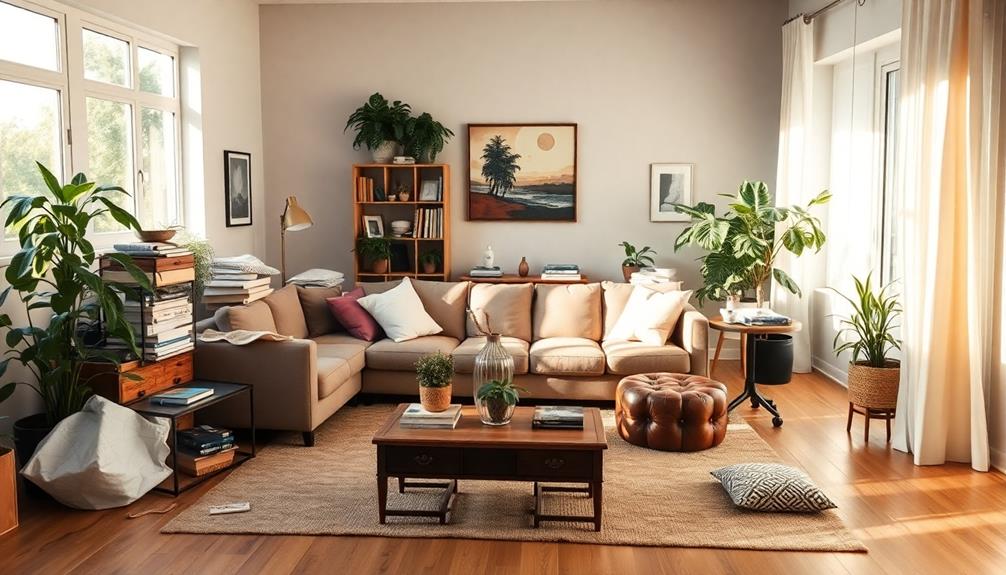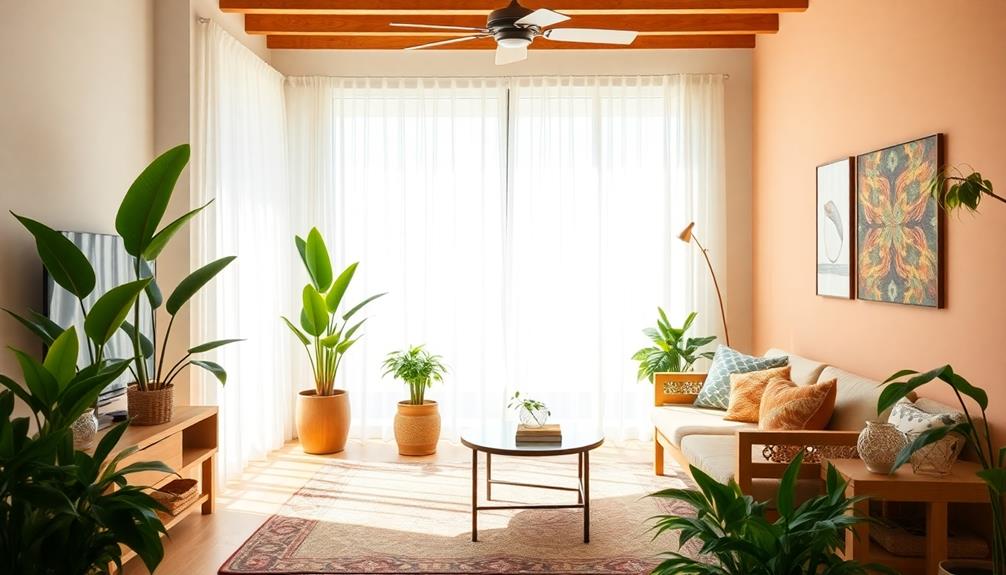Don’t sabotage your feng shui by making common furniture mistakes. Ensure your doors can swing open freely to allow positive energy to flow. Leave at least 18 inches of space around your bed for better sleep and position your desk where you can see the door. Clear out clutter to boost your mood and energy flow. Define the function of each room and arrange furniture to encourage natural movement and conversation. Stay tuned for more tips on improving your home’s harmony and well-being. Adding plants and natural elements can also enhance your space and support your physical and emotional health. Simple fixes, such as using soft lighting and calming colors, can further create a balanced home that promotes relaxation and peace. By making these thoughtful adjustments, you’ll create a nurturing environment for both your spirit and your well-being.
Key Takeaways
- Ensure doors can swing open fully without obstruction to promote positive energy flow and avoid stagnation.
- Position the bed with a solid wall behind it and at least 18 inches of space around it for restful sleep and balanced energy.
- Place your desk in a commanding position where you can see the door, enhancing focus and productivity.
- Regularly declutter your space to keep pathways clear and maintain an uplifting atmosphere that supports mental clarity.
- Define each room's purpose and arrange furniture to facilitate natural movement and conversations, preventing stagnant energy.
Blocked Doors
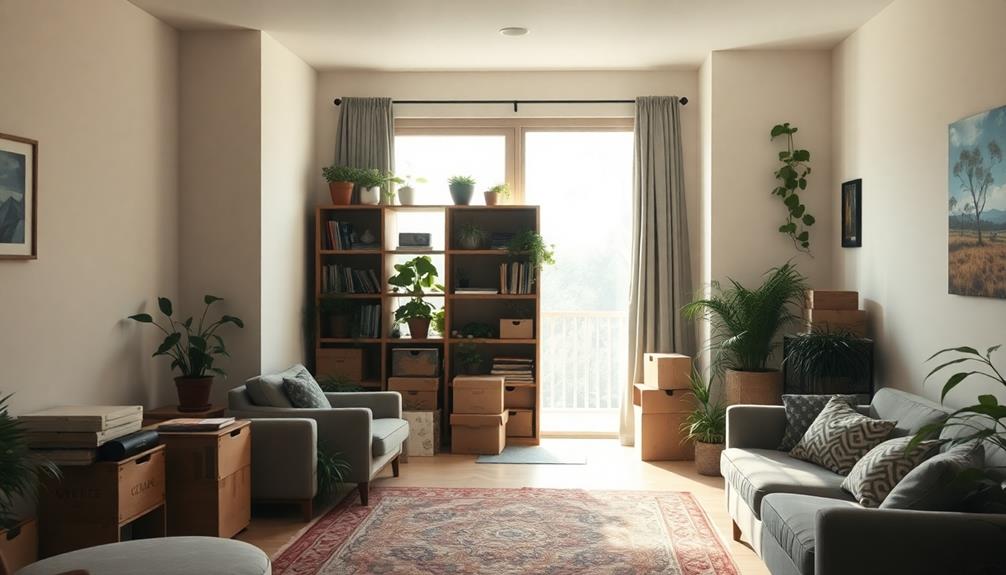
When it comes to feng shui, blocked doors can really disrupt the flow of positive energy, or qi, in your space. These doors symbolize movement and communication, so when they're obstructed, it stifles the energy in the room.
Incorporating elements like vibrant Indonesian decorative pillows can enhance the overall atmosphere while maintaining a clear pathway. If you've got clutter piled up behind doors, you're preventing them from opening fully, creating stagnation that can lead to negative energy.
Furniture placement also plays a significant role in maintaining good feng shui. If your furniture obstructs doorways or limits their functionality, it can lead to feelings of confinement and disharmony in your living space.
To invite positive qi, make sure your doors can swing open a full 90 degrees without any hindrance. Regularly evaluating and adjusting your furniture around doors not only enhances the energy flow but also promotes a sense of command position, where you feel in control of your environment.
Beds Out of Command

Make certain you have at least 18 inches of space around your bed. This encourages positive energy flow and accessibility, preventing feelings of confinement.
Additionally, a solid wall behind your headboard stabilizes the energy, supporting restful sleep. If you want to see the door while lying in bed without direct alignment, consider using mirrors strategically. Incorporating elements of Balinese design aesthetics, such as natural materials and soothing colors, can further enhance your bedroom's tranquility.
Avoid pushing your bed against a wall with inadequate space, as this disrupts the balance of yin and yang energy in your bedroom.
Remember, creating balance and harmony in your space is essential. Follow these Feng Shui tips to guarantee your bed is in a commanding position, enhancing your overall well-being and allowing energy to flow freely in your sanctuary.
Prioritize your comfort and safety for a more restful night's sleep.
Desk Placement Issues
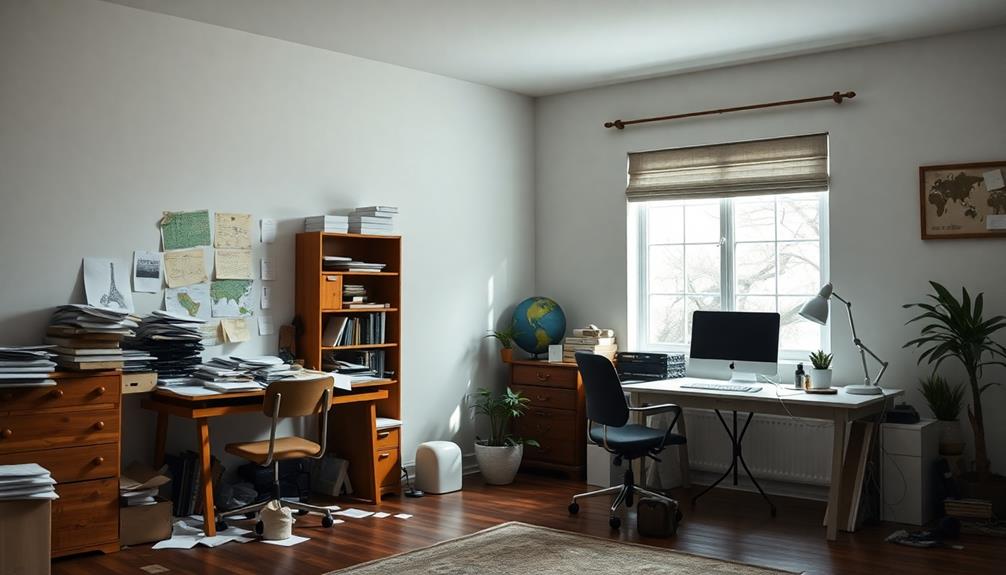
Desk placement plays an essential role in maintaining productivity and energy flow in your workspace. Ideally, you should position your desk in a commanding position, allowing you to see the door without being directly in line with it. This setup enhances focus and gives you control over your environment.
Incorporating natural materials and open spaces, as seen in traditional Indonesian style home decor, can also create a calming atmosphere that supports your work. If your desk faces a window, consider using window coverings to prevent qi from escaping, which can drain your energy and disrupt your productivity.
Placing your desk in a bedroom can blur work-life boundaries, making it hard to relax. If you must work in this space, use screens or curtains for visual separation from your sleeping area. This helps establish distinct boundaries between work and rest, promoting a more balanced lifestyle.
Moreover, be mindful of your desk's organization. A cluttered desk obstructs energy flow and creates a chaotic atmosphere. Keeping your workspace tidy fosters a positive environment that encourages productivity.
Cluttered Spaces
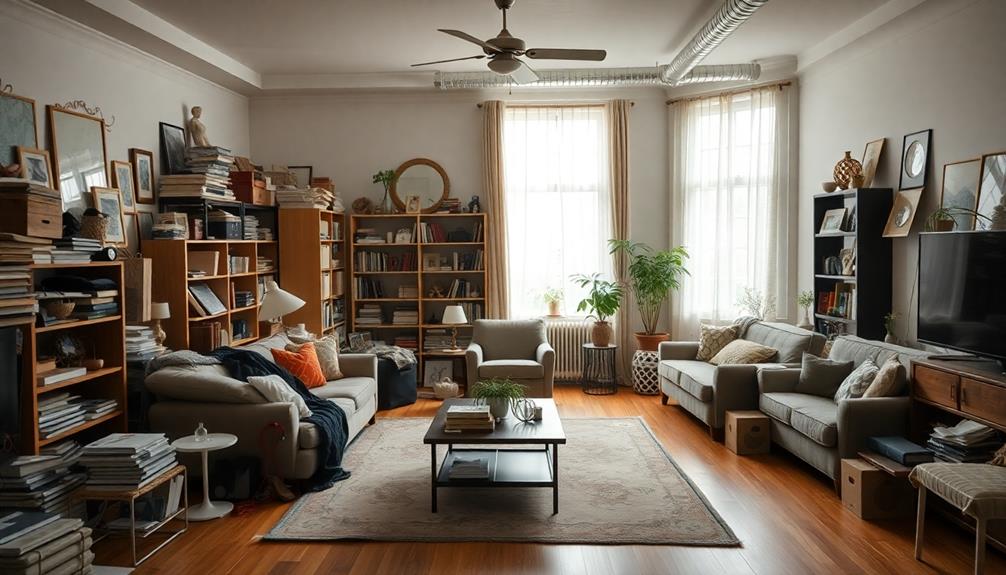
In a harmonious home, cluttered spaces can greatly obstruct the flow of positive energy, or qi, leading to feelings of stress and overwhelm. Incorporating unique decorative elements, like Indonesian decor masks, can enhance the aesthetic appeal of your space while reflecting rich cultural heritage.
When your environment is clean and organized, it not only elevates your mood but also boosts the flow of energy around you. Clutter creates negative energy that can weigh you down, making it difficult to focus and relax.
To promote a peaceful and calming atmosphere, take time to declutter regularly. Remove items that no longer serve you or evoke negative emotions. A clutter-free home encourages mental clarity and tranquility, allowing for better focus and productivity.
When you arrange your furniture, make sure that all pathways and spaces—especially around doors—are free from clutter. This keeps the energy flowing smoothly and prevents any obstructions that might block the flow of energy.
Improper Room Functionality
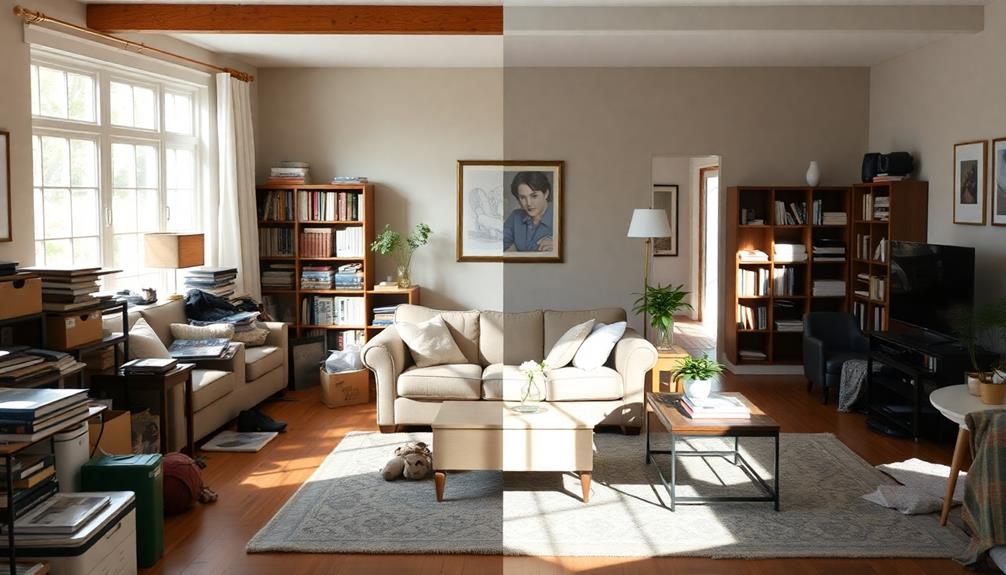
When setting up your home, defining each room's primary function is essential for creating a space that feels both inviting and functional.
In your living room, effective furniture placement enhances energy flow and encourages natural movement. Instead of isolating your seating arrangement to face a single focal point, like the TV, arrange your furniture to foster conversation and connection. This not only promotes interaction but also prevents stagnant energy.
To achieve a harmonious atmosphere, consider incorporating elements from luxury tropical design aesthetics that blend natural elements with modern luxury.
Incorporating multi-functional furniture can notably improve room functionality. Pieces like storage ottomans or extendable dining tables reduce clutter and create a harmonious environment.
Frequently Asked Questions
What Colors Should Be Avoided in Feng Shui?
In feng shui, avoid excessive dark colors like deep purple and black, bright neon shades, and any hue that triggers negative memories. Red can provoke tension, so balance it with calming shades for harmony.
What Is Not Good in Feng Shui?
In feng shui, clutter's like a traffic jam for energy. You shouldn't block doors or put your bed in a direct line with them. Avoid desks in bedrooms to keep work stress at bay.
What Is Bad Feng Shui for a Living Room?
In your living room, avoid blocked doorways, cramped furniture against walls, overly bright colors, and large pieces that overwhelm. Choose calming decor, and steer clear of negative symbols to foster positive energy and harmony.
How to Arrange Furniture for Good Feng Shui?
So, you think tossing furniture anywhere's fine? Think again! To enhance feng shui, position your bed diagonally from the door, keep spaces clear, and avoid desk-window standoffs. Your energy—and sleep—will thank you!
Conclusion
In the dance of life, your furniture should move gracefully, not trip you up. By avoiding these common Feng Shui mistakes, you're not just rearranging your space; you're inviting harmony and balance into your daily rhythm. Think of your home as a flowing river—each piece of furniture needs to enhance the current, not block it. Embrace mindful placement, and watch as your environment transforms, nurturing your spirit and allowing positive energy to flourish.
